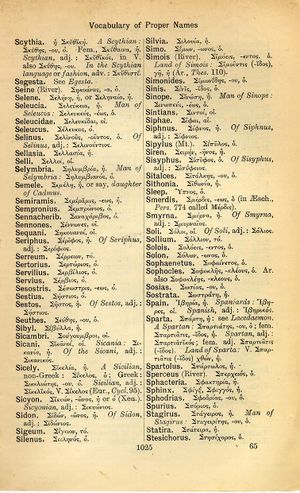Smyrna
ἔκστασίς τίς ἐστιν ἐν τῇ γενέσει τὸ παρὰ φύσιν τοῦ κατὰ φύσιν → what is contrary to nature is any developmental aberration from what is in accord with nature (Aristotle, On the Heavens 286a19)
English > Greek (Woodhouse)
Σμύρνα, ἡ.
Of Smyrna, adj.: Σμυρναῖος.
Latin > English (Lewis & Short)
Smyrna: (in the best MSS. Zmyr-na), ae, f., = Σμύρνα,
I a celebrated maritime city of Ionia; according to some, the birthplace of Homer, still called Smyrna, Cic. Fl. 29, 71; id. Agr. 2, 15, 39; id. Att. 9, 9, 2; Liv. 33, 36; 37, 35; Stat. S. 4, 2, 9 al.— Hence, Smyrnaeus (Zmyr-), a, um, adj., of or belonging to Smyrna, Smyrnean: sinus, Mel. 1, 17, 3: conventus, Plin. 5, 29, 31, § 120: vates, i. e. Homer, Luc. 9, 984; cf. of the same, plectra, Sil. 8, 595; and, tubae, Sid. Carm. 23, 131.—Plur. subst.: Smyr-naei (Zmyr-), ōrum, m., the inhabitants of Smyrna, Cic. Arch. 8, 19; Liv. 37, 16, 8. —
II An ancient name of Ephesus, Plin. 5, 29, 31, § 115.
Latin > French (Gaffiot 2016)
(1) Smyrna (Zmy-), æ, f., Smyrna, la même que Myrrha, sujet d’un poème d’Helvius Cinna : Catul. 95, 1.
(2) Smyrna¹² (Zmy-), æ (Σμύρνα), f.,
1 Smyrne en Ionie [une des villes qui prétendaient avoir donné le jour à Homère] : Cic. Fl. 71
2 Smyrna Trachea Plin. 5, 115, un des quartiers d’Éphèse || -næus, a, um, de Smyrne : Plin. 5, 120 || d’Homère, [et par ext.] héroïque, épique : Luc. 9, 984 ; Sil. 8, 595 || Smyrnæī, les habitants de Smyrne : Cic. Arch. 19 ; Liv. 37, 16, 8.

